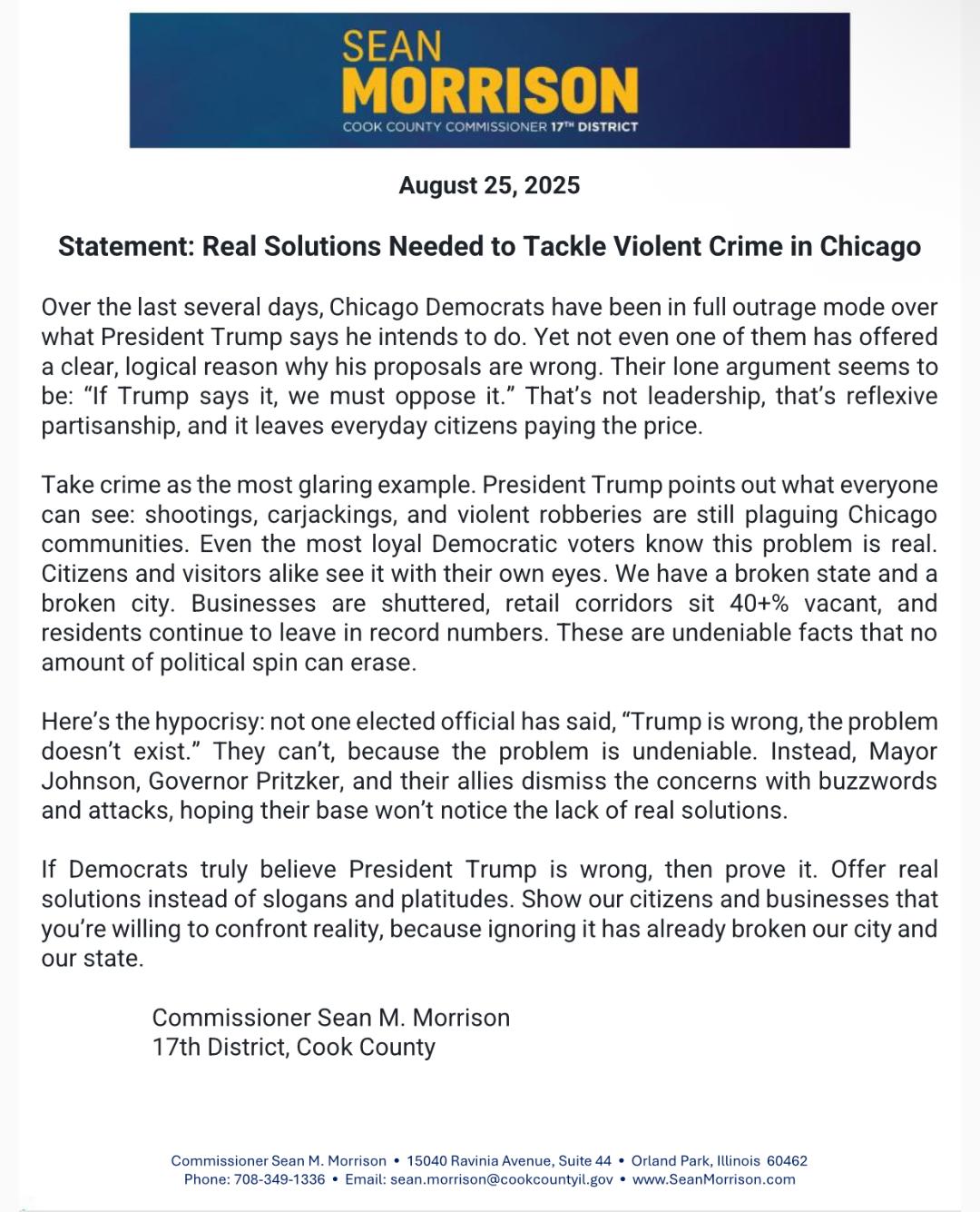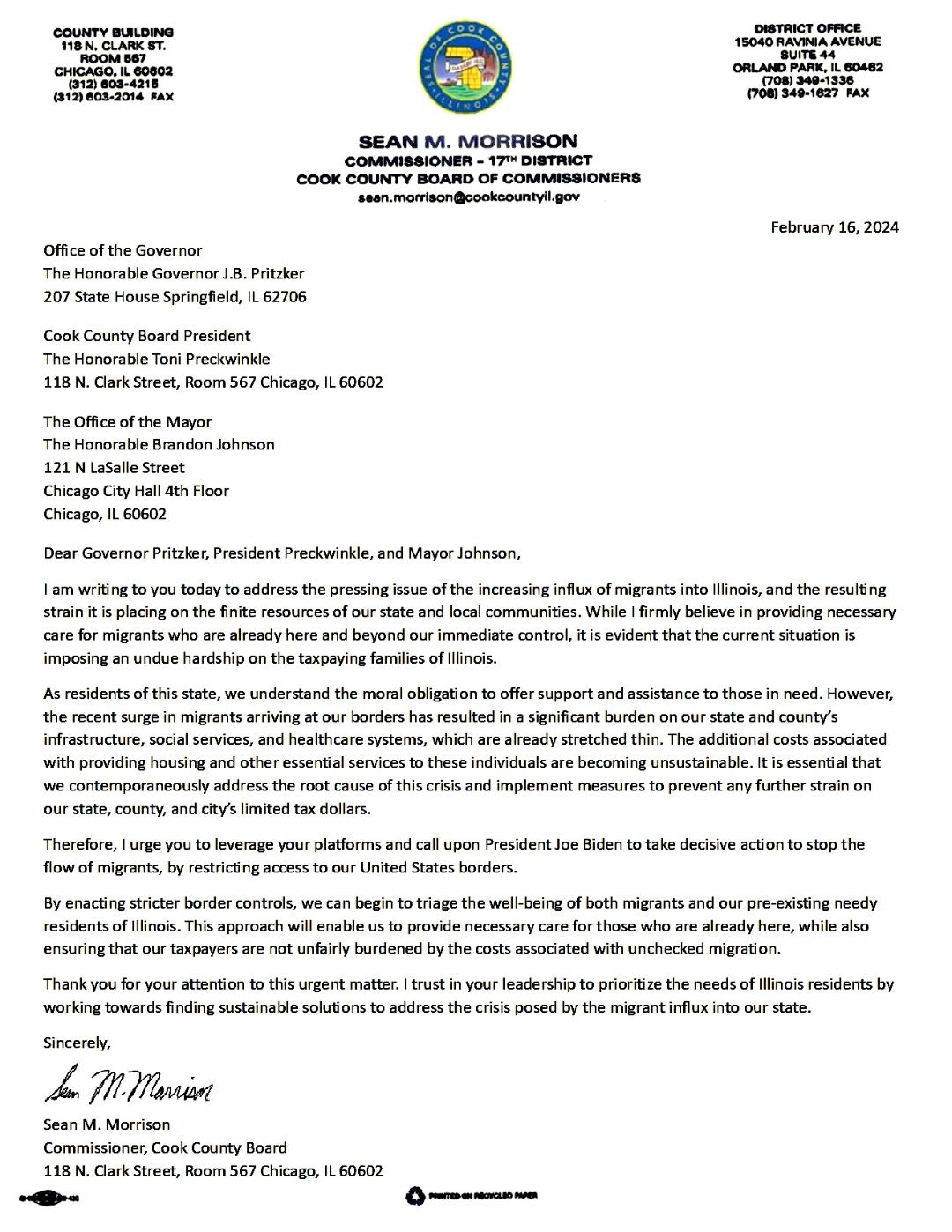STAY UP TO DATE




On April 29, Commissioner Sean Morrison joined nationally syndicated Talk Show Host Vince Coglianese on his podcast to discuss Governor JB Pritzker's inflammatory political remarks from the previous weekend. Click on the video image below and go to the 22 minute mark to watch Vince's interview with Sean.










Unsustainable Migrant Crisis Wreaking Havoc on Illinois and Local Communities - Time for Border Closure

Headlines
ORLAND PARK, IL – Today, Commissioner Sean Morrison joined Chief Michael Schofield and his Orland Fire Protection District staff at their Narcan Nasal Spray Training Seminar for local police departments. This grant program administered by the Orland Fire Protection District and Commissioner Morrison’s 17th District Office provides training and Narcan Nasal Spray supplies at NO COST to suburban police departments for their officers to carry while on patrol.
By supplying police officers with the Narcan Nasal Spray, it will allow them to immediately treat overdose victims they encounter on a call where every minute and literally every second counts.
If your police department might be interested in participating in our Narcan Nasal Spray program, please contact our 17th District Office at: 708-349-1336.
| By a vote of 16-1, the Cook County Board passed a resolution today out of the Criminal Justice Committee that moves to defund the Cook County Sheriff’s Office. The lone dissenting vote was from Commissioner Sean Morrison who pointed to three main points for his opposition. – The resolution castigated all law enforcement as inherently racist. – The resolution does not substantively address the issue of police misconduct. – The resolution jeopardizes funding for policing of suburban communities. Commissioner Morrison went onto to add that now is not the time to consider defunding law enforcement, especially with the staggering increase in violent crime this year. He noted the recent data from the Chicago Police Dept. which reported 31 murders from July 6 to July 12 – a 417 percent increase from the 6 murders recorded during the same time last year, statistics show. The city saw 116 homicides during the most recent 28-day period, compared to the 41 reported in 2019. “There’s too much politics surrounding the ‘Defund the Police’ movement. We need to be focused on saving lives right now. My primary concern is for the most vulnerable communities who will see less police protection which means more crime, more violence, and sadly, more tragedy,” said Commissioner Morrison. Morrison also provided the Violence Against Children data from the Chicago Police Dept. which listed 203 Children Shot and 35 Children Killed since January 1, 2020 in the city of Chicago. Morrison concluded his remarks by highlighting recent polling numbers in his suburban 17th District which showed an overwhelming majority of residents (80%) opposed ‘Defunding the Police’. MEDIA CONTACT: Chris Provenzano 312-804-8434 (M) |

On July 9, the Forest Preserves will reopen the Swallow Cliff Stairs near Palos Park and the parking lots for the site and other adjoining preserves. Many public restrooms that have been closed since early March will reopen on July 9 as well, and groups of up to 25 can once again grill and bring in coolers.


Preckwinkle’s March 10 order is set to expire at the end of May, though, if approved by the board of commissioners at their May 21 meeting, the order could be extended through Sept. 30.
By Rachel Hinton May 15, 2020, 3:11pm CDT
Cook County Board President Toni Preckwinkle is seeking an extension of the disaster proclamation that allows her to keep on making more unilateral decisions, hoping to stretch the order until the end of September, because the county remains “in the midst of, this historic crisis.”
But one commissioner questioned why Preckwinkle needs months more of the additional power, dubbing the move “a massive overreach.”
Preckwinkle’s original March 10 order is set to expire at the end of May, though, if approved by the County Board at its May 21 meeting, the order could be extended through Sept. 30.
Preckwinkle is seeking the extension because Cook County “is still responding to, and in the midst of, this historic crisis,” a spokesman said.
“This remains a challenging moment in our County’s history and we continue planning for Cook County’s recovery from this pandemic,” the statement continued. “This extension falls in alignment with our recently released Cook County COVID-19 Response Plan.”
A co-sponsor of the proposed resolution, Commissioner Larry Suffredin, D-Evanston, said there’s “more stability in giving a longer time frame now that we understand what’s happening” with the virus and what impact it will have on the county.
“If we’re meeting as we are now, we can always repeal this,” Suffredin said. “For purposes of planning … if all you’re doing is doing things in 30-day increments, some of those things are harder to do. I think this is more prudent.”
The March order allows Preckwinkle to “issue any necessary Executive Orders to provide for the continuity of government to the extent possible, including addressing authorizations that may usually require the advance approval of the County Board; institute any such closures that may be necessary and implement any rules or regulation that may benefit the Cook County workforce and residents of Cook County during this Proclamation of Disaster” if the board or its Finance Committee are unable to meet in March or April.
The September extension, if passed, would “assist Cook County, by and through its Department of Emergency Management and Regional Security, to continue to coordinate county and municipal resources and response activities, in an effort to prevent and reduce further damage and hazards, protect the health and safety of persons, protect property and provide emergency assistance pursuant to Illinois law,” the resolution reads in part. There’s no mention in the updated language of Preckwinkle being able to issue any emergency executive orders she deems necessary, but Suffredin said she would still have those powers.
The county will need to set up more personal protective equipment distributions and purchases, as well as some work force issues, like how to make sure the courts have what they need to open safely, Suffredin said.
Commissioner Sean Morrison, R-Palos Park, didn’t see a need for the extension and said neither Preckwinkle nor her team — nor his fellow commissioners — reached out to explain the need for the 120-day extension of the proclamation.
“The governor is extending things in 30-day increments, why are we extending 120 days? We conducted a meeting just last month — there’s no reason to [have this order] anymore,” Morrison said. “This is a massive overreach. It was requested, rightfully so, the first time, but as I’m sitting here now there’s been no explanation so I couldn’t support it as I sit here right now.”
Morrison questioned the legality of extending the order and wondered if the county could face lawsuits, noting that Gov. J.B. Pritzker is being sued for extending his stay-at-home order.
Suffredin said he didn’t agree with his GOP colleague, arguing it makes sense to extend the order now that the summer, and the beginning of the county’s budget season, are looming ahead.
And Suffredin rejected any suggestion it was power grab.
“Power grabs are fun when having the power makes you really important, but a power grab in a pandemic just gives you more responsibility and stress,” Suffredin said. “I admire the way President Preckwinkle has handled the responsibility and stress and don’t find there’s any abuse of power here.
“This is a reasonable amount of time — it gets us through the summer and then we’re going to be in budget mode come Oct. 1, and we’re going to have to make a lot of decisions on the budget. September seemed more reasonable [than the end of the year].”
New data from Rush University Medical Center offers a glimmer of optimism. “We’re hoping we continue to see this change in the doubling time and the next few weeks we start to see something that resembles a peak.”
(Bloomberg) — Illinois, among the U.S. states with the most coronavirus cases, may be showing signs of slower Covid-19 spread earlier than other major hot spots, according to a new analysis.
The state, which has reported more than 19,180 confirmed cases, stretched the number of days over which cases double to 7.9 as of April 9 from 2.1 on March 22, data compiled by Rush University Medical Center in Chicago showed.
The so-called implied doubling rate is a key indicator public health officials use to project the number of Covid-19 patients that hospitals can expect to see, as well as how many doctors, nurses, beds, ventilators and masks may be needed and when.
The analysis by Rush, which tracked the growth rate from the day hot-spot states confirmed their 100th cases, found Illinois’s rate of doubling is taking longer than New York, California and Washington state at this stage in its outbreak. The higher the number, the better.
For comparison, 25 days after reporting the first 100 instances, confirmed cases doubled every 6.1 days in New York, every 6.6 days in Washington and every 5.1 days in California, according to Rush.
“We’ve seen that doubling time is longer and longer,” Bala Hota, a doctor specializing in infectious diseases and Rush’s chief analytics officer, said in a telephone interview. “It’s a positive. This whole conversation is about mitigation. It’s about controlling what’s already here.”
Hota cautioned, however, that the model can change direction if virus clusters develop quickly.
Illinois Governor J.B. Pritzker’s stay-at-home order, which runs through April 30, as well as earlier measures to close schools, restaurants and bars, helped slow the surge of Covid-19 infections, allowed hospitals to prepare, and curbed some strain on the state’s health care system, Hota said.
“We’re hoping we continue to see this change in the doubling time and the next few weeks we start to see something that resembles a peak,” Hota said. He added that Rush is monitoring outbreaks in confined areas such as Cook County Jail.
Testing, tracing and how the population can be allowed to ease back into daily activities while preventing a fresh spike in cases all need careful consideration, Hota said.
Even amid positive signals on the growth rate, Illinois faces challenges including a higher rate of infection in the black community. Mortality rates for black coronavirus patients in Illinois are five times higher than for white residents, Illinois Department of Public Health Director Ngozi Ezike said.
At Pritzker’s daily press briefing on Friday, Ezike said Illinois is working to serve all its residents and to erase disparities. Today, officials reported an additional 81 deaths in Illinois and 1,293 new cases.
While the curve may be starting to flatten, health-care professionals are still preparing for a surge.
“It’s fair to say that there’s a glimmer of hope,” Benjamin Singer, pulmonary and critical care specialist at Northwestern Memorial Hospital, said in a telephone interview on Friday. Yet he worries that a return to normal routines too quickly may erase gains.
“Even though we are starting to see our efforts have been effective, it’s not clear how long we are going to maintain this level of curve flattening,” Singer said. “We need to be ready. We don’t want to be caught unprepared. The ideal situation is that all of our contingency plans stay just as plans. I would not feel bad at all for over-planning for this.”
Contact Us
Chicago Office
118 N. Clark Street, Suite 567
Chicago, Illinois 60602
Phone : 312-603-4215
Fax: 312-603-2014
District Office
15040 Ravinia Ave, Suite 44
Orland Park, Illinois 60462
Phone: 708-349-1336
Fax: 708-349-1627

